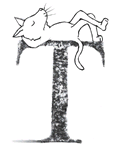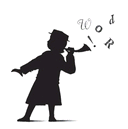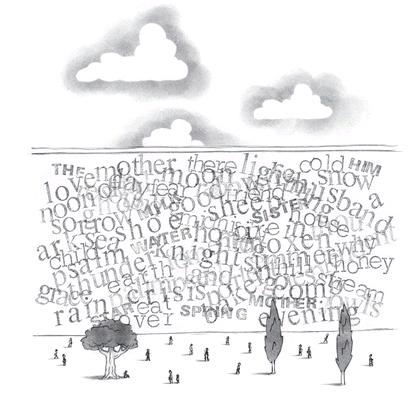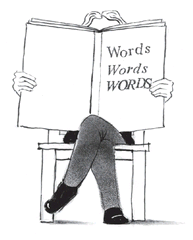The Word Snoop (5 page)
Authors: Ursula Dubosarsky


Spelling Test
Geoffrey Chaucer was a wonderful, funny, imaginative poet who lived in England in the fourteenth century. Here’s a quote from one of his poems. If you were his teacher marking it today, how many spelling mistakes would you spot? Try not to be too hard on him
—
remember there was no such thing as a dictionary then, let alone spellcheck . . .
—
remember there was no such thing as a dictionary then, let alone spellcheck . . .
But every thyng which schyneth as the gold,
Nis nat gold, as that I have herd it told
Nis nat gold, as that I have herd it told
And what about this one?
And gladly wolde he lerne
and gladly teche.
and gladly teche.
Oh well, at least he got and right!

It’s not just spelling that makes English strange, though. What about plurals?
Plural means more than one. (I know, I know, you knew that already!) In English, when you want to make a word plural you just add an
s
. So a cat becomes cat
s
, sausage becomes sausage
s
, and—
s
. So a cat becomes cat
s
, sausage becomes sausage
s
, and—
But wait a minute. What about mouse? You can’t say two mouse
s
. And what about sheep? There’s no such thing as many sheep
s
. Or three woman
s
—and what about one knife and two kni
v
e
s
? And one hero and two hero
es
. What’s that all about?
s
. And what about sheep? There’s no such thing as many sheep
s
. Or three woman
s
—and what about one knife and two kni
v
e
s
? And one hero and two hero
es
. What’s that all about?
You’re right. It’s not always just an
s
. (There they go again, those dastardly exceptions . . .)
s
. (There they go again, those dastardly exceptions . . .)
The Anglo-Saxons (remember them?), who began the English language, had quite a few ways of making a plural. For some words they added
es
, but for others they added an
r
or an
en
, or sometimes both. This is why today we still say child and child
ren
, and ox and ox
en
. They also had plurals that changed the sound
inside
the word instead of at the end, like man and m
e
n, foot and f
ee
t, tooth and t
ee
th. Then there were words in Anglo-Saxon that didn’t change at all in the plural, like sheep and fish. And as for things like leaf and lea
ves
? Well, in Anglo-Saxon, an
f
at the end of a word sounded like
v
anyway, and over time somehow the
v
made its way into the plural spelling.
es
, but for others they added an
r
or an
en
, or sometimes both. This is why today we still say child and child
ren
, and ox and ox
en
. They also had plurals that changed the sound
inside
the word instead of at the end, like man and m
e
n, foot and f
ee
t, tooth and t
ee
th. Then there were words in Anglo-Saxon that didn’t change at all in the plural, like sheep and fish. And as for things like leaf and lea
ves
? Well, in Anglo-Saxon, an
f
at the end of a word sounded like
v
anyway, and over time somehow the
v
made its way into the plural spelling.
Now, I’m sure you haven’t forgotten William-the-Conqueror-who-came-to-England-from- France-and-conquered-it-very-quickly. (Um, have you?) Anyway, as I was telling you, William and all his friends and relatives (there were lots of them) spoke French, and in French usually they just added an
s
to make a plural. This fine idea became popular in English as well, and is now the most common way to do it.
s
to make a plural. This fine idea became popular in English as well, and is now the most common way to do it.
So, there are the Anglo-Saxon plurals and the French plurals, but there’s yet another type of plural in English that you may have noticed—the Latin and Greek plurals. During the Renaissance (from the fourteenth to the sixteenth century)
,
educated people felt that the ancient languages of Latin and Greek were really the best of all. So they started to throw Latin and Greek words into English—words like
crisis
or
radius
. But then, what if they wanted to mention more than one crisis or radius? Crisis
es
and radius
es
sounds terrible (especially if you happen to have a lisp). So instead they kept the Latin and Greek ways of making plurals for those sorts of words—cris
es
and rad
ii
.
,
educated people felt that the ancient languages of Latin and Greek were really the best of all. So they started to throw Latin and Greek words into English—words like
crisis
or
radius
. But then, what if they wanted to mention more than one crisis or radius? Crisis
es
and radius
es
sounds terrible (especially if you happen to have a lisp). So instead they kept the Latin and Greek ways of making plurals for those sorts of words—cris
es
and rad
ii
.
That explains at least where some of these plurals come from. But, like the funny spellings, it doesn’t explain why we don’t just change it all to something easier. I mean, there are languages like Japanese and Chinese, spoken by millions and millions of people, that don’t even have plurals and it doesn’t bother anyone.
Well, I suppose in the end, language, like history, is made by human beings. And human beings are so hopelessly different and disorganized, they can never quite agree on anything. They’re only human, after all. (Sigh.)
Still, maybe there’s something special about having these crazy plurals, and even crazier spellings. I sometimes think English is like a big old wall that people have been scribbling on for centuries. How sad it would be if someone came along and just sloshed a huge can of paint over the top of it, and everything disappeared and all we had left was a nice, clean wall . . .

English is a language with a lot of different words—actually hundreds of thousands of them. If you ever look in a dictionary that tells you where a word originally comes from (this is called etymology), you will see that English words come from many different languages—French, Latin, Norse, Dutch, Greek, Hindi, Arabic, Yiddish, Japanese—and more.
But the first English words came from the German language called Anglo-Saxon—otherwise known as Old English. We owe a lot to those Anglo-Saxons. The days of the week, for example. Sunday, Monday, and Saturday are named after the sun, moon, and Saturn, but the other days take their names from Anglo-Saxon gods. So Tuesday is “Tiw’s day” (god of battle); Wednesday is “Woden’s day” (god of war); Thursday is “Thor’s day” (god of thunder); and Friday is “Frigg’s day” (goddess of love).
And even though there are now hundreds of thousands of other words in English, most of our common everyday words still come from Anglo-Saxon. Beautiful strong, short, simple words, like:
sun, moon, land, friend, hope, snow, shame, smile, groan, love, live, wife, house, child, man, fight.
sun, moon, land, friend, hope, snow, shame, smile, groan, love, live, wife, house, child, man, fight.
Don’t be fooled, though. If we Word Snoops went back in time, we wouldn’t be able to understand very much of what anyone was saying in those days. Anglo-Saxon was just too different to what we now speak, especially in how it sounded and was spelled. But if you’re really interested, you can still learn Anglo-Saxon at college one day. (See you there!)
Hey, just for fun, have a look at the list on the opposite page and see if you can write a sentence that only uses Anglo-Saxon words. Here’s a little Anglo-Saxon rhyme the Word Snoop just made up to give you an idea.
My brother eats cold cheese at night
And butter in the morning light.
And butter in the morning light.
(Mmm, yum!)
Some Anglo-Saxon words used in Modern English
a, and, at
after
all
bed
before
brother
butter
by
cheese
child
cold
day
drink
earth
eat
egg
father
fear
fight
fire
friend
go
good
hill
his, him, her
home
honey
hope
house
in, on, over
land
light
lightning
live, love
man
meat
midnight
milk
moon
morning
mother
my, me
name
night
noon
rain
sea
shirt
shoe
sister
smile
snow
sock
sorrow
spring
star
summer
sun
the, then, there
thunder
to
up
water
why
winter
with
after
all
bed
before
brother
butter
by
cheese
child
cold
day
drink
earth
eat
egg
father
fear
fight
fire
friend
go
good
hill
his, him, her
home
honey
hope
house
in, on, over
land
light
lightning
live, love
man
meat
midnight
milk
moon
morning
mother
my, me
name
night
noon
rain
sea
shirt
shoe
sister
smile
snow
sock
sorrow
spring
star
summer
sun
the, then, there
thunder
to
up
water
why
winter
with
Nowadays there are over a billion people in the world who speak English, but back in the sixteenth and seventeenth centuries in Britain there were only around five million. Yet from that small number came some of the greatest writers in the English language.
One was the playwright and actor William Shakespeare, who lived from 1564 to 1616. He wrote hundreds of poems and nearly forty plays, among them some of the most famous plays ever written—
Hamlet, Macbeth, Romeo and Juliet, Antony and Cleopatra, A Midsummer Night’s Dream—
the list goes on. Even if you’ve never seen or read any of Shakespeare’s plays, I bet you’ll know some of the lines he wrote, because they are quoted everywhere—lines like “parting is such sweet sorrow”; “to be or not to be, that is the question”; “the game is up” and “good riddance!” (Ring any bells?)
Hamlet, Macbeth, Romeo and Juliet, Antony and Cleopatra, A Midsummer Night’s Dream—
the list goes on. Even if you’ve never seen or read any of Shakespeare’s plays, I bet you’ll know some of the lines he wrote, because they are quoted everywhere—lines like “parting is such sweet sorrow”; “to be or not to be, that is the question”; “the game is up” and “good riddance!” (Ring any bells?)
Because Modern English was such a quickly growing language when Shakespeare was alive, there are also hundreds of totally new words that were published for the first time in his plays. Words like
bedazzle
,
unearthly
,
madcap
,
bloodstained
,
watchdog—
and that’s just a few of them. Some people think that Shakespeare may have invented these words himself—or it may be that he was just the first to write down words he heard people using around him. Whatever the case, Shakespeare’s passion for English and his dazzling ability to turn words into rich, unforgettable stories and characters has made him the most loved writer in the history of the language. His work is read over and over again, and has become part of all our lives, whether we know it or not.
bedazzle
,
unearthly
,
madcap
,
bloodstained
,
watchdog—
and that’s just a few of them. Some people think that Shakespeare may have invented these words himself—or it may be that he was just the first to write down words he heard people using around him. Whatever the case, Shakespeare’s passion for English and his dazzling ability to turn words into rich, unforgettable stories and characters has made him the most loved writer in the history of the language. His work is read over and over again, and has become part of all our lives, whether we know it or not.

The other writers from that early time who had a huge impact on how we speak and write English today were actually translators—people who change one language into another. How could they be so important? Well, it’s because what they translated was the Bible.
The Bible, of course, was not originally in English, but in the ancient languages of Hebrew and Greek. As Christianity spread, the monks translated it into Latin, the language used in schools and universities. But then the idea began that it should be translated into English so that ordinary people (who didn’t happen to know Hebrew or Greek or Latin) would be able to understand it.
Well, that probably sounds like a good plan to you, but many church leaders were against it. They thought that only educated people could truly understand the Bible, so it should stay in Latin or its original languages. In the sixteenth century, anyone who tried to translate the Bible into English could be arrested. The most gifted of these translators was a man called William Tyndale. He was arrested, put in prison, and even executed in 1536. (Amazingly, he was so committed to his work he asked if he could have his Hebrew Bible, dictionary, and grammar book in prison so he could keep on translating!)
Other books
Magestorm: The Reckoning by Chris Fornwalt
Magic in the Mix by Annie Barrows
Cowboys and Indies: The Epic History of the Record Industry by Gareth Murphy
Tangled Up in Love by Heidi Betts
Hot Shot by Matt Christopher
The Game of Love: (BWWM Romance) by K. Alex Walker
Grim Crush (Grimly Ever After) by S.L. Bynum
Wittgenstein's Mistress by David Markson, Steven Moore
Because of His Heart (For His Pleasure, Book 27) by Kelly Favor
Dark Heart Rising by Lee Monroe